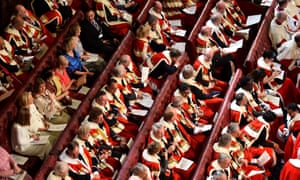“My family first became Earls of Devon a long, long time ago, at the time of the Empress Matilda in 1142,” Charles Courtenay, the 19th Earl of Devon, tells Helen Pidd. “They were actually the first barons to raise their standard in support of our first female monarch, Matilda, who got usurped by King Stephen.
“They were rewarded for that act by being granted an earldom, and I am the fifth creation of the earldom. So it’s had lots of stumbles along the way, a number of beheadings, but we’ve been in service and living in Devon ever since.”
Courtenay talks about his work in the House of Lords, where he has held a seat since 2018, and why he believes hereditary peers are an asset to the house.
“We look at things in 100-, 200-, 300-year horizons,” he says. “The problem with the modern environment is everybody’s looking at financial returns, political cycles, everything is five, 10 years. What about future generations?”
Most hereditary peerages were abolished by Tony Blair’s government in 1999 and now Keir Starmer plans to abolish the remaining 92 seats.
“It is a ridiculous privilege, and I’m not shy of noticing that,” Courtenay says. “Yes, in many people’s eyes, it is anachronistic, and this is progress. I really regret, though, that the Labour party hasn’t taken on the opportunity of properly reforming the House of Lords.”

Photograph: Ben Stansall/PA WIRE
Support The Guardian
The Guardian is editorially independent.
And we want to keep our journalism open and accessible to all.
But we increasingly need our readers to fund our work.

